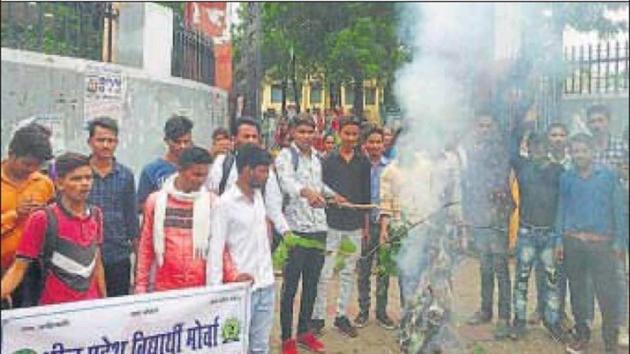Tribal students’ body poses stiff challenge to NSUI, ABVP in elections
For 3 consecutive years, Bhil Pradesh Vidyarthi Morcha winning students’ union election in Dungarpur.
After sweeping students’ union elections in the colleges of Dungarpur district for three successive years, the Bhil Pradesh Vidyarthi Morcha (BPVM) is emerging as a serious challenger to the traditionally strong student bodies, such as NSUI and ABVP, in the tribal districts of Rajasthan.

This time the BPVM — which emerged from a social movement among the tribal community in 2016 — is fielding candidates for students’ union elections in Udaipur, Banswara, Pratapgarh districts also, said Popat Khokhariya, state convenor of the BPVM.
“We have fielded candidates in three government colleges in Udaipur district, three colleges in Banswara district and one in Pratapgarh district,” he said.
This is in addition to the six government colleges in Dungarpur district, where the BPVM has swept all posts in the student unions in the last three years.
Khokhariya said the reason is that National Students’ Union of India (NSUI), the student wing of the Congress party, and Akhil Bharatiya Vidyarthi Parishad (ABVP), the student wing of the BJP, have failed to give space to political aspirations of students from the region and have not raised issues relevant to them.
“Tribal students face problem in getting scholarships despite reservation in government colleges; they are pushed out of admissions by SC and OBC students and have to study in private colleges. But these issues were never raised by NSUI or ABVP,” he said.
Traditionally, the NSUI, the ABVP and the Students’ Federation of India SFI used to win the students’ union elections or they used to extend support to independent candidates who won the elections.
Khokhariya said among other issues being raised by the BPVM is access to girls in higher education. “We are demanding that the incentive of ₹5,000 given to girls who go for higher education be increased to ₹10,000,” he said.
Other demands include hike in scholarships, filling vacant posts of teachers in colleges, providing basic facilities in colleges such as common rooms for girls, toilets and classrooms.
“But the fight is larger,” said Kantibhai Roat, a tribal community leader, who contested the Lok Sabha elections on a Bharatiya Tribal Party (BTP) ticket. The BTP emerged shortly before the 2018 assembly elections and won two seats in Dungarpur district.
Roat said the BPVM and BTP have a political understanding and BPVM is offering issue based support. “It is a fight for identify of the tribals. The tribal and other leaders in mainstream political parties have ignored our problems and concerns,” he said.
Roat said preserving and protecting tribal culture is a major concern. “Outsiders are coming into the tribal region and diluting our culture. We are also demanding carving out of a Bhil Pradesh comprising tribal dominated areas in Rajasthan, Gujarat and Madhya Pradesh,” he said.
He said tribal heroes did not find mention anywhere. “We want that schools and colleges in our region be named after our heroes and they should find space in the school textbooks. Our tribal language, Bhili, should be taught in schools,” he said.
As for the victories in students’ union elections, Roat admitted that vote polarisation helped the BPVM win. “The numerical strength of tribal students is more than general students which gives us an advantage,” he said.
However, he said that the other parties too fielded tribal candidates, but they did not win.
“It’s a question of faith. Students believe that we are working in their interest and that of the community. We have been working at the community level since the past few years and people trust us.”
Bhanu Pratap Singh, media in-charge of the NSUI, conceded that it has lost ground to the BPVM. “BPVM poses a serious challenge. We have lost some of our support base in tribal areas due to BTP and BPVM,” he said, adding that the BPVM also had an advantage as tribal students were in majority.
Anand Paliwal, national vice president of the ABVP, too agreed that the BPVM presents a challenge.
“They are emerging as a force in the region. But their focus is narrow and limited to caste. ABVP doesn’t believe in raising caste or creed issues on campuses. We are taking along everyone and we have strong support,” he said.












